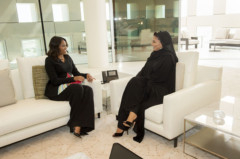
Manama: Dr Sakena Yacoobi, Founder and Executive Director of the Afghan Institute of Learning (AIL), has been named the 2015 WISE Prize for Education Laureate.
Popularly known as Afghanistan’s mother of education, Dr Yacoobi, 65, has spent two decades working persistently to rebuild her country’s education landscape, devastated by war.
The WISE Prize for Education was presented by Shaikha Moza Bint Nasser, Chairperson of Qatar Foundation for Education, Science and Community Development (QF), at the Opening Plenary session of the seventh World Innovation Summit for Education (WISE) in Doha, Qatar.
The Summit is a global initiative of QF, and the award was received before some 2,000 members of the WISE community from diverse fields and over 150 countries, QF said in a statement.
First awarded in 2011, the WISE Prize for Education recognises an individual or a team for outstanding achievement in any field of education. The WISE Prize for Education raises global awareness of the crucial role of education in all societies, and is a testament to QF’s commitment to building the future of education by unlocking human potential.
“Our WISE Prize for Education Laureates embody the spirit of WISE,” Shaikha Moza said. “They are tireless advocates for the right to education. This year’s Laureate is distinguished by her determination to bring education to her fellow citizens in the most adverse conditions of war and occupation. From refugee camps to secret night schools, and often at great personal risk, she established a network of organisations that provide general education as well as public health education. While her work focuses on girls and women, it also benefits boys and men. Millions have benefited from her optimism,” she said.
For Sakena, it all began in the early 1990s, when she started working in Afghan refugee camps in Pakistan.
A passionate educator herself, she trained teachers, opened schools for children, and learning centres for women. The Taliban rule in the mid-1990s did not deter her from her mission to provide education and health services to women and children, especially girls.
She launched the Afghan Institute of Learning (AIL) in 1995, with the primary objective of improving teacher training through innovation. AIL’s teacher training programmes focus on quality, in-depth education for Afghan teachers in Pakistan and Afghanistan. Once teachers are trained in the basics of teaching, AIL offers workshops to strengthen their teaching skills.
When the Taliban banned girls’ education in the 1990s, AIL supported underground home schools for 3,000 girls across the country. It was also the first organisation to open learning centres for women in the country and continues to find innovative ways to provide literacy and vocational skills to girls and women.
Under her leadership, AIL has established itself as a ground-breaking, visionary organisation which works at the grassroots level to empower women and communities. This bottom up approach has triggered a lasting local transformation. Since its establishment, AIL has brought education and health services to at least 12 million beneficiaries living in rural and marginalised areas of Afghanistan.
More recently, Sakena opened private schools to provide high quality affordable education. She also set up a radio station, to deliver her institute’s educational content to people living in remote areas. Her future plans also include the creation of a television network and a university for women.
“I feel honoured and blessed to be chosen as this year’s WISE Prize for Education Laureate,” Sakena said upon receiving the prize. “It is particularly meaningful because this is such a crucial time in Afghanistan. My people live in terror and poverty. They are suffering and feel hopeless. Yet, at this moment a light has appeared. With this Prize, we know that we can continue to educate more and more Afghans, giving them hope and encourage them to go forward no matter what they are facing. It is such a great gift to me, and I dedicate the Prize to the Afghan Institute of Learning and all of the women, men and children we are educating.”











